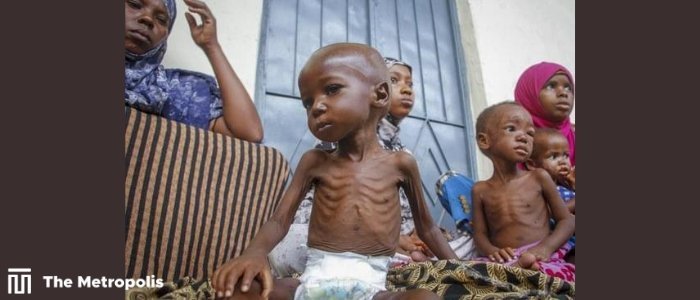Photo: AP-
Metropolis Desk-
One-third of the population is anticipated to experience crisis-level or worse food needs as Somalia’s “dire hunger emergency” worsens, but the UN has been obliged to dramatically reduce food assistance due to a shortage of financing, the head of the World Food Program said on Thursday.
The most recent food security numbers, according to Cindy McCain, show that more than 6.6 million Somalis urgently need aid, with 40,000 of them “fighting for survival in famine-like conditions.”
However, she claimed that WFP was compelled to reduce monthly food assistance, which had peaked at 4.7 million recipients in December, to barely 3 million at the end of April – “and without an immediate cash injection, we’ll have to cut our distribution lists again in July to just 1.8 million per month.”
McCain stated that during her recent trip to Somalia, she observed: “how conflict and climate change are conspiring to destroy the lives and livelihoods of millions of Somalis.” She claimed that the nation’s longest-ever drought, which destroyed crops and killed millions of cattle, recently gave way to catastrophic flash floods in the south.
McCain pleaded with donors to continue being as generous as they were to save Somalia “from the abyss of famine in 2022.” He also issued a dire warning that millions of Somalis’ lives are on the line.
In April, Antonio Guterres, the secretary-general of the UN, traveled to Somalia “to ring the alarm” and make a case for “massive international support” for Somalia.
However, the outcomes of a high-level donors’ summit for Somalia, Ethiopia, and Kenya on May 24 were incredibly dismal. Of the more than $5 billion organizers hoped to raise to assist more than 30 million individuals, less than $1 billion was raised.
After three decades of upheaval brought on by warlords, the Al-Qaeda-linked Al-Shabab extremist group, and the development of Daesh-affiliated extremist groups, Somalia has only recently started to regain its footing. Hassan Sheikh Mohamud, who presided over Somalia from 2012 to 2017, was re-elected to the presidency by lawmakers in May of last year following a protracted campaign.
Al-Shabab has attacked Somalia on multiple occasions, and most recently, the government launched what has been called its biggest operation against the extremist group in more than a decade.
The government’s efforts, according to Catriona Laing, the new UN special envoy for Somalia, have rendered Al-Shabab militarily weak and driven its fighters from several locations, which is “a notable achievement.”
Nevertheless, Laing claimed that Al-Shabab “remains a significant threat,” citing “a recent resurgence in the scale, tempo, and geographic distribution” of its assaults, which included a June 9 attack that claimed nine lives on the Pearl Beach Hotel in the capital Mogadishu.
A troop from the African Union is helping the government forces in Somalia fight Al-Shabab. The Security Council overwhelmingly approved a new African Union transition mission, known as ATMIS, last year to assist the Somalis until the end of 2024, when their forces will assume full control of the nation’s security.
The drawdown of ATMIS and handover are moving forward, according to Laing, but she noted that based on her early analysis, “the complexity, the constraints, and the pace of the transition process presents risks and this will be challenging.”
Source – Arab News



